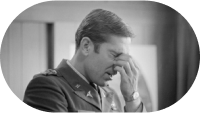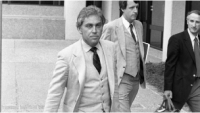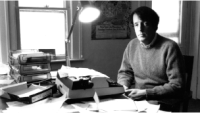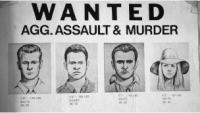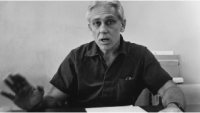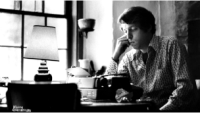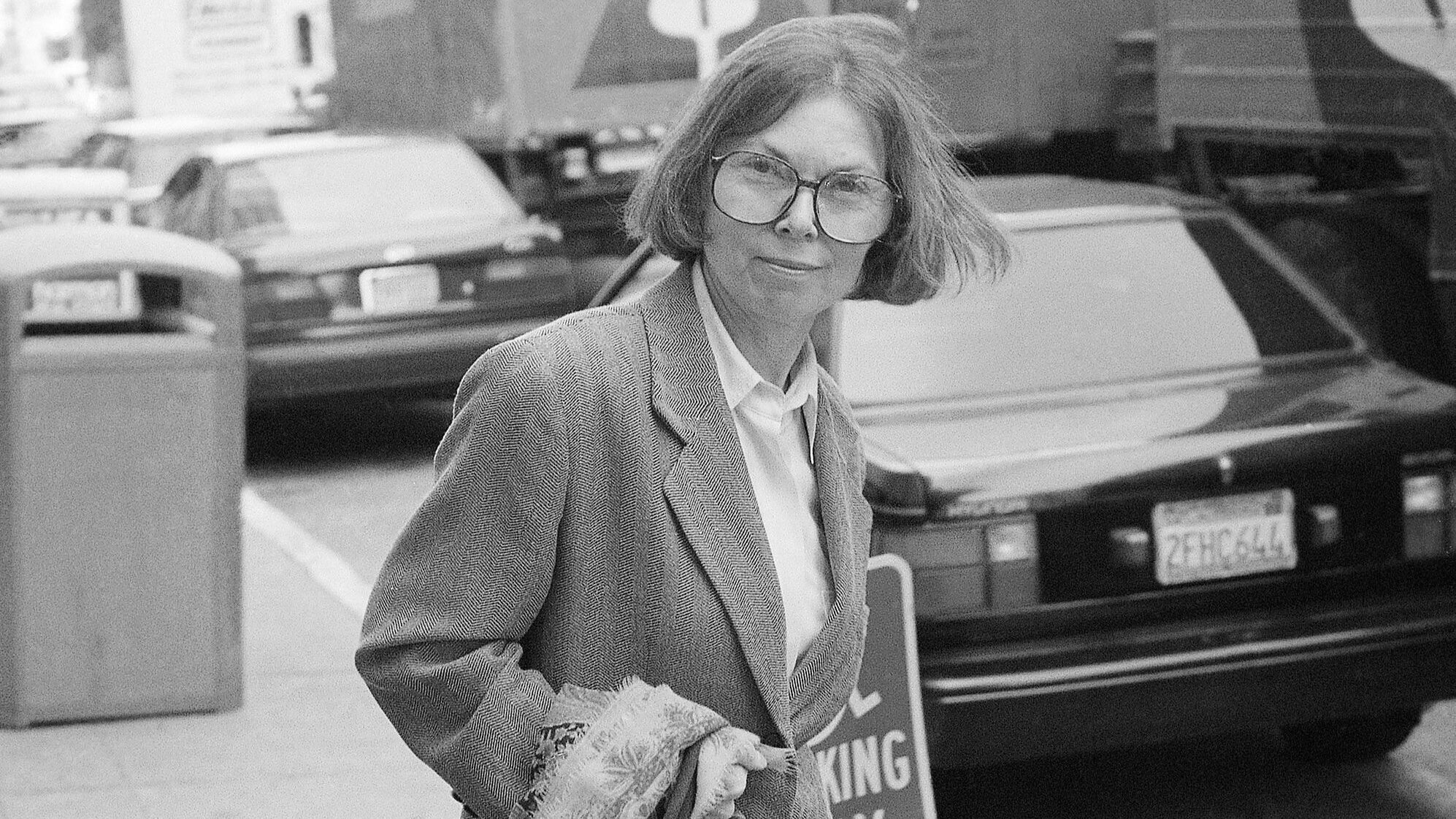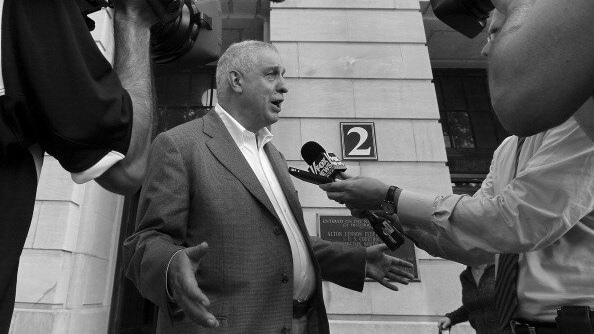How Many Lies Would You Tell To Get To The Truth? - Episode 6 | Morally Indefensible Podcast
EPISODE 6
MORALLY INDEFENSIBLE
CHAPTER 6 | HOW MANY LIES WOULD YOU TELL TO GET TO THE TRUTH?
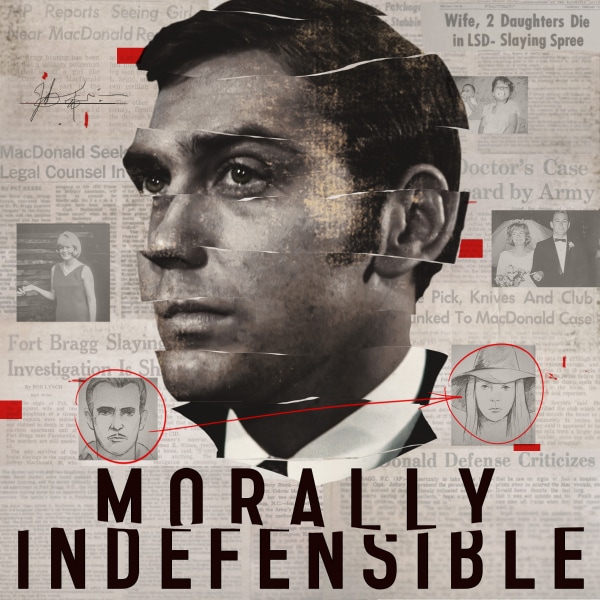

“There was a gleam in his eye, and I always knew that a gleam in Joe’s eye was a good sign that something big was going to happen.”NANCY DOHERTY, JOE MCGINNISS'S WIDOW.
ALL EPISODES
EPISODE TRANSCRIPT
CHAPTER 6 | HOW MANY LIES WOULD YOU TELL TO GET TO THE TRUTH?
Throughout this episode of Morally Indefensible, you’ll hear dramatic recreations of court transcripts, edited for clarity.
Movie Trailer : The most controversial true crime story of the decade. Based on today’s best seller, Fatal Vision.
In the Fall of 1984, NBC turned Joe McGinniss’s bestseller Fatal Vision into a miniseries.
Anchor : Millions of viewers watched the two-part series of Fatal Vision here on NBC. 60 million on Sunday alone.
Anchor 1: Did you see any of it?
Anchor 2 : No I was working last night, saw bits and pieces of it, and I wish I had. Almost everybody did watch it.
Stombaugh : God knows what kind of maniacal rage seized him then, but he came back to Colette and struck her a vicious blow, with the club…
Gary Cole : You’re sitting there telling me that I killed my wife and kids!
Investigator : I think so.
Judge : What is your verdict?
Jurors : Guilty. Guilty. Guilty. Guilty. Guilty (verb out)
[TV OFF]
Brian : I forget how I learned about the TV show coming out but I remember we were concerned about it.
Brian O’Neill was Jeffrey MacDonald’s appellate attorney. In episode four he uncovered new evidence about the four intruders Jeff said murdered his family. And he was hoping to get Jeff a new trial.
[MUSIC]
Marc : That movie shows Jeffrey murdering his family covered in blood.
Brian: Yeah. On national TV.
Brian : So I contacted NBC....I said you know you might think about fairness in the criminal justice system.
NBC invited O’Neill on the Today Show to make his case.
Gumbel : Good morning to you, Mr. O’Neill. This docudrama wasn't titillating. It wasn't sensationalized. What was your problem with the airing of it?
Brian O’Neil : There are pending in the federal court several motions, uh, seeking a new trial. Uh, those motions in great detail prove who did it. And it wasn't Dr. MacDonald…
Brian O’Neill (on NBC) : It's our concern that when we get a new trial, we're not going to have a fair audience before whom to present it.
[MUSIC POST]
Gumbel : Quick final note, Mr. O’Neill, you have 10 seconds. Go ahead…
Brian (on NBC) : Ok, uh if you go down there you’ll find that the man on the street knows everything about this case.
Gumbel : Gentlemen, I’ve gotta say thank you.
[MUSIC OUT]
Not long after that interview on NBC, O’Neill was home watching television when he saw a new advertisement for Fatal Vision.
Brian O’Neill : On Saturday night, don’t, don't hesitate to see the movie that Jeff MacDonald's lawyers have tried desperately to stop!” God damn it, they set me up. I was part of their pitch now.
Fatal Vision would become one of the most watched TV miniseries of all time.
[CHANNEL CHANGE]
Jurors : Guilty, guilty guilty!
[CHANNEL CHANGE]
Jurors : Guilty, guilty guilty!
[CHANNEL CHANGE]
Larry King: We’re back with our interview with Jeffrey MacDonald… did he hurt you with regard to appeals?
Jeff MacDonald: I think it has, Larry. I think it has. And that’s because they replay that miniseries every time I go to court!
[FINAL CHANNEL CHANGE]
Jane Pauly : Tonight NBC concludes rebroadcast of the movie Fatal Vision… MacDonald is in a federal penitentiary serving three life sentences. Just last month he was denied a request for a new trial in the Fourth Circuit Court of Appeals.
[TV OFF]
Nancy : Joe was served. And at first it seemed ridiculous.
This is Nancy Doherty, Joe’s widow.
Nancy : And he wanted a whole lot of damages.
Jeff sued Joe for 15 million dollars.
Nancy: Jeff said that Joe had hurt his feelings…Made his hair fall out and he lost weight. And just been terribly mean to him. It seemed almost farcical. I mean, we practically laughed about it. In fact, I think we did laugh, but only for about five minutes. [pause]
[MUSIC OUT]
Nancy: How could you be sued by a murderer?
[THEME]
[TITLE SEQUENCE]
Mike Wallace : Joe McGinniss spent four years with Jeffrey MacDonald in order to write the definitive book about him...it is called Fatal Vision
Joe : I would like very much for it to be the best book I’ve ever done and in order for that to happen, I’ll need a period of total immersion in all facets of your past.
King: Fatal Vision is number one on the bestseller list.
[i knew a man…]
Pauley : Why would he cooperate in such a damning book!?
[who lied to the world...]
Keeler: He didn’t understand that Joe McGinniss had this MO of worming his way into the confidence of somebody and then turning around and screwing him.
[Hid from the truuuuuth]
Wallace : Joe McGinniss thinks he’s found the key, new evidence he discovered after the trial.
[Lived a liiiife with no ruuules]
Joe: A drug called Eskatrol among the side effects are temporary psychosis often manifested as a rage reaction.
JEFF : Well obviously I hope the book doesn’t sell a copy. I wish the book would burn.
I’m Marc Smerling, and this is Morally Indefensible.
[and he maaaade promiseees]
[THEME OUT]
Chapter Six… How Many Lies Would You Tell to Get to the Truth?
ACT ONE
Floyd : I mean of all the suits one can imagine, a suit by a murderer!
Buckley : I know, it’s as though Charles Manson filed for libel…
Floyd : Or Manson filed a jaywalking claim or something.
[MUSIC IN]
In 1987, Joe McGinniss went on Firing Line... to talk with William F. Buckley about the lawsuit Jeff had filed against him.
Buckley : So the book came out and he filed suit? What does he allege?
McGinniss : Fraud, intentional infliction of emotional distress, breach of contract...
Buckley : We do have a contract here.
You might remember from episode one Joe and Jeff signed a contract. Joe would get full access to Jeff and his defense team, and Jeff would get a third of the book’s proceeds.
McGinniss : He signed a release absolving me from any future litigation.
But there was a catch...
Joe : His lawyer added a hand-written notation that said that, “As long as...”
Jeff (Crossfade) : So long as the essential integrity of my life story is maintained.
Buckley: Oh boy. If it hadn’t been for that sentence there wouldn’t have been a case?
Jeff said that Joe had broken their contract. That he’d committed fraud by lying about what he was writing. And that Fatal Vision did not maintain the essential integrity of Jeff’s life story.
Floyd Abrams: It’s hard to believe. The integrity of his life is that he’s a murderer.
Joe McGinniss: That’s a fact.
Floyd Abrams : That’s a fact.
Bill Buckley : That’s a fact.
[MUSIC OUT]
[COURTROOM SFX]
But it was also a fact that Joe McGinniss found himself sitting across from Jeffrey MacDonald in a federal courtroom in Los Angeles.
NANCY : The first time actually I saw Jeffrey MacDonald in person was at the civil trial. He was sitting nattily dressed at the plaintiff’s table.
Nancy Doherty again.
NANCY: My blood ran cold. It just was like an icicle in my heart seeing him. I thought it was like looking at evil.
Judge : Order in the court.
Bostwick VO : Good afternoon, ladies and gentlemen...
This is a recreation of Jeffrey MacDonald’s lawyer’s opening statement. His name was Gary Bostwick.
Bostwick (RECREE) : This...is not a retrial of the criminal case that took place in 1979. It’s not a case about the murder trial. It is a case about a false friend. What you are going to see is evidence of a person who betrayed a friend.
At the center of Bostwick’s case were the many letters Joe had written to Jeff after the trial.
Bostwick (RECREE) : In those letters you will be able to read the demonstration of friendship, love, support that Mr. McGinniss communicated to Dr. MacDonald.
Joe : Spend a summer making a new friend and then the bastards come along and lock him up? But not for long Jeffrey, not for long....
Bostwick (RECREE) : But the defendant had decided that in fact this man that he had befriended was guilty of the crimes he was charged with. But he didn’t tell Dr. MacDonald that and he has never told him that, not even today. We are going to try to show that the reasons that he kept it to himself are quite clear.
Jeff : This is Jeff to Joe… Tape 1, Side 1.
According to Bostwick, Joe needed Jeff…
Joe : I am the only one who hears these tapes. ...
... to get those tapes…
JOE : Hang as loose as you can.
To get access to Jeff’s condo...
Bostwick: Dr. MacDonald trusted him enough to show him all the documents that he had in his condominium that had to do with the case.
McGinniss (reverb) : In notes prepared for his own attorneys, he goes into great detail about his consumption of a drug called Eskatrol.
Bostwick: To make a best-seller Mr. McGinniss had to be on the inside. He had decided already that Dr. MacDonald was guilty. He had to get everything he could out of him.
[MUSIC OUT]
If Bostwick could show that Joe decided Jeff was guilty before he wrote Fatal Vision, he might convince the jury that Joe had breached the contract and committed fraud.
[FX COURTROOM IN]
Bostwick: Mr. McGinniss, You decided sometime during the trial or shortly after the trial that Dr. MacDonald was guilty of the crimes he’d been charged with, didn’t you?
JOE : Well, decided is a very interesting word to use in that context. I would say that I didn’t reach a final decision until I finished writing my book.
Bostwick already knew that Joe had been asked that same question many times, on his press tour for Fatal Vision.
[MUSIC IN]
[TV ON]
Buckley : Was there a point before the publication of the book at which you had concluded that he was guilty.
[TV CHANNEL CHANGE]
Pauley: Found him, in your heart of hearts, guilty….
[TV CHANNEL CHANGE]
Host : At one point you felt he was innocent. And the name of Helena Stoeckley turned you around, am I right?
And there was one story Joe told consistently. You've heard it before in this podcast. When Helena Stoeckley took the stand during the trial, Joe was in court... watching Jeff…
Joe: "When this woman who he said had been one of the hippies who broke into the apartment that night, he was confronted by her in the courtroom...the absolute absence of emotion toward her -- no anger, no hostility, no nothing. I said to myself for the first time, there’s something very wrong with this man."
Host: And that’s when you began to turn.
In the courtroom Bostwick reads another interview Joe gave to a newspaper on his book tour.
Bostwick : “For McGinniss, that moment of truth came during the testimony of Helena Stoeckley whom the defense accused of being one of the murderous hippies.”
Bostwick : Did you ever tell anyone that?
JOE : No. I don’t recall ever telling anyone that I decided that he was guilty when Helena Stoeckley took the stand.
JOE : You know, there’s a difference, Mr. Bostwick, between what your head tells you and what your heart wants to believe. I was trying awful hard to believe that this guy hadn’t done that thing.
[MUSIC OUT]
Now, Bostwick hands Joe a letter he'd written to his editor, Morgan Entrekan, in 1981. Two years before Fatal Vision was even published.
Joe (REVERB): Dear Morgan ...I spoke to him last night and he kept referring to “our book” … the ice is getting thinner and I’m still a long way from shore.
Bostwick : What did you mean...that the ice was getting thinner and you were still a long way from shore?
Joe : Well, I meant that MacDonald’s gradually growing awareness of the fact that this book wasn’t necessarily going to come out the way he wanted to was something that could eventually turn into a problem.
Bostwick : So you were keeping things from him.
Joe : Always. If not always, frequently an author will permit a subject to continue to feel that the subject is manipulating the author, sure.
Bostwick : Mr. McGinniss, I’m not asking about other authors, I’m asking about you.
Joe : I think that he had no right to know what my private opinion was at that time.
Bostwick: I’m not asking you that. I’m asking you if you weren’t trying to hide it from him…
Joe : Well, hide is your word, my word is reserve the right to my own opinion.
But Joe did more than hide his opinion about Jeff ‘s guilt. Bostwick hands Joe another letter he wrote to his agent, Sterling Lord... just before Fatal Vision came out…
[TYPING]
Joe (Reverb) : The irony of all this is that so far MacDonald has not even seen the book and still has no idea how mad he’s really going to be...
Joe and his agent were looking for a way to launch Fatal Vision into the world with a bang...
Joe: I think your 60 Minutes idea may be best.
[TYPING OUT/COURTROOM IN]
60 Minutes would be the first news show to interview Jeffrey MacDonald before Fatal Vision came out. At that time Joe still hadn’t given Jeff a copy of the book to read...
JOE (Reprise) : For not the first time but I hope for the last time, you will be sent a copy of the book when there is a copy of the book to send.
But Joe had given a copy to Mike Wallace of 60 Minutes.
BOSTWICK : He gave the manuscript to 60 Minutes long before the book was to be published….
Then, Joe took advantage of Jeff’s ignorance...
Reprise (Reverb): By all means, hype the book. Tell the world.
He asked Jeff to sit for an interview with Mike Wallace. The trap was set. You might remember how that turned out...
Jeff : I also wasn’t taking Eskatrol.
Wallace : It's in your notes again in your own handwriting! 3-5 capsules of Eskatrol spansule. That's speed!
Bostwick : All the way down to the end of the process Mr. McGinniss continued to delude and misrepresent what was going on.
Finally, Joe sat down with Mike Wallace too, to say publicly, for the first time, what he had hidden from Jeff.
Wallace: Thumbnail sketch of Jeffrey MacDonald. The man you know.
Joe: Charming, engaging... and absolutely ruthless and beyond morality.
[MUSIC OUT]
ACT TWO
[COURTROOM SFX]
Lawyer Gary Bostwick had presented evidence that Joe McGinniss had lied to Jeffrey MacDonald while writing Fatal Vision.
[MUSIC IN]
Now, he had to convince the jury that Joe had lied in the book itself.
Bostwick : Mr McGinniss, How much amphetamine can cause psychotic rage?
Joe : ….I don't know in milligrams.
Joe’s theory in Fatal Vision was that Jeffrey had attacked his family after a few weeks of taking the popular diet pill Eskatrol. Bostwick hands Joe a copy of the book and points to a section.
Bostwick: Mr. McGinniss, do you see in the book where it says “a toxic psychosis may occur after periods of weeks” ?
Joe : That’s right.
Now Bostwick pulls out a medical book the same book Joe used as a reference for Fatal Vision.
Bostwick: Would you read that portion?
Joe : A toxic psychosis may occur after periods of weeks to months of continued use.
Bostwick: It says weeks to months of continued use.
Joe : That’s correct.
Bostwick: You left that out of Fatal Vision in the quote, didn’t you?
Joe : Sure.
Bostwick: And you didn’t put an ellipses to show that you left out something at the end of the sentence, did you?
Joe : Fatal Vision does not include the complete sentence or paragraph, that’s correct.
Bostwick didn’t end up finding a lot of lies in Fatal Vision. But he did prove that Joe McGinniss had left out an ellipses....
[MUSIC OUT]
Bostwick’s grueling cross-examination of Joe McGinniss lasted four and a half days. Now it was time for Joe’s defense. This is a recreation of Joe’s lawyer’s opening statement to the jury. His name was Daniel Kornstein.
Kornstein : Ladies and gentlemen, it wasn’t Joe McGinniss who convicted this murderer. It wasn’t Joe who sentenced him to three consecutive life terms, the harshest sentence possible. But the murderer can’t sue the jury or the courts or the supreme court, so he lashes out at the author of the book.
Kornstein: If a convicted murderer can sue an author who writes a book that says what the jury did in convicting him was correct, then who is free from being sued about what they write?
Kornstein : Joe McGinniss’s craft, his duty, his obligation, as the evidence will show, is to the truth.
[MUSIC IN]
Kornstein argued that the truth in the case had already been established. And he wanted the jury to remember just who was suing his client. So, he called Jeffrey MacDonald to the stand.
Kornstein: Isn’t it true that on February 17th, 1970 your pregnant wife Collette was found dead with a fractured skull, 16 stab wounds from a knife in her neck and chest and 21 stab wounds from an ice pick in her chest?
Jeff : That’s true.
Kornstein : In 1979, weren’t you unanimously convicted by a jury for her murder?
Jeff : That’s what the jury said, yes.
Kornstein : And on February 17th, 1970 isn’t it true that your five year old daughter Kimberly was found dead with a fractured skull, a broken nose and eight to ten stab wounds from a knife to her neck?
Jeff : Yes, that’s true.
Kornstein: In 1979, weren’t you unanimously convicted by a jury for her murder?
Jeff : Yes, that’s true.
Kornstein: ...And haven’t your convictions been confirmed by all the courts, including the Supreme Court?
Jeff : Yes, that’s true.
[MUSIC OUT]
Next... Kornstein wanted to show the jury that Joe McGinniss wasn't the only one who breached the contract.
Kornstein : You never denied Mr. McGinniss access to any information about the case. Isn’t that true?
Jeff : Yes, that’s true.
In that contract, Jeff granted Joe access to everything involved with his defense during and after the trial. That was the deal.
Kornstein: But there was one exception, wasn’t there?
Jeff : Not that I recall.
[MUSIC IN]
Kornstein knew that Jeff had taken a polygraph test soon after the murders. Joe wanted to see that test and wrote to Jeff in prison to ask for the results. Jeff responded with an audio tape.
[tape click]
Jeff : Cleve, I think, Backster… he hooked me up to the machine, and … he began going over my sexual history. It was very bizarre. He started talking about had I ever had sex with women other than Colette. And I answered that. And then he asked had I ever had sex with men. And I stopped him, and I said, uh, I don’t understand what we’re doing here…
Kornstein: Isn’t it true that Cleve Backster did give you a complete polygraph on April 23, 1970?
Jeff : That is not my recollection at all.
Kornstein : Isn’t it true that in the polygraph examination you denied involvement in the murders?
Jeff : I don’t recall him asking me questions like that.
Kornstein : Isn’t it true that Cleve Backster told you that the polygraph showed deception on your part?
Jeff : No that is not true.
(COURT HUBUB)
Kornstein: Isn’t it true that when you denied authorization to Mr. McGinniss in February of 1983, you were trying to cover up the results of the polygraph examination?
Jeff : No that is not true.
Kornstein : We call Cleve Backster to the stand.
[MORE COURT HUBUB]
Kornstein : Did you ask MacDonald any questions about his extramarital sexual activities?
Backster : No.
Kornstein : Did you ask MacDonald any questions about homosexual activities?
Backster : None whatsoever
Kornstein : Do you recall what MacDonald's responses were to the questions about whether he had inflicted the wounds that led to the death of his family?
Backster : The answers were no to each of these questions.
[MUSIC OUT]
Kornstein : All right. Now, would you tell us the conversation that you had with MacDonald about the results of the polygraph that day?
Backster : I would have told him that I could not be of help to him in his defense because he had failed the polygraph test.
[HUB BUB]
Kornstein : And what was his reaction?
Backster : We had a very -- I would state a very dignified conversation I brought up an interesting point, and this does stick to my mind because it's not anything that I would do often during polygraph testing. Our conversation led into my interest in Eastern philosophy, and if there were substance to the idea of karma, the fact that you have to pay for your crimes in this lifetime, perhaps in another existence, it might be better that he clear this up in this lifetime rather than to wait until later. And it was interesting because I got a very puzzled reaction from him, and he asked me, Do you really believe in that?
And I said, yes, I think possibly it could be so. And that was the end of the conversation.
ACT THREE
Joseph Wambaugh: My name is Joseph Wambaugh. I’m a writer, and I was a cop for 14 years with LAPD. And what else?
In 1979, Joseph Wambaugh was one of America’s most successful true crime writers.
Joseph Wambaugh : I read about the Jeffrey MacDonald case, when it first happened of course. The savage overkill of Jeffery MacDonald’s wife, and especially the two young children. It was just such a monstrous job that was done on them. That was unusual.
[phone ringing in distance…]
Before Jeff sat down with Joe McGinniss, he sat down with this Joe…
[phone pick up]
Wambaugh : My wife and I were contacted. Must have been by his attorney.…
Wambaugh was just the kind of guy Jeff was looking for… a bestselling writer with a big audience.
[MUSIC OUT]
Wambaugh : And we met at a restaurant in Long Beach.
[Restaurant SFX]
Wambaugh : And in grisly detail, he told basically the same story that had been in all the news accounts. It was preposterous the story he told and in a kind of detached monotone.
[MUSIC IN]
When he told about the wounds inflicted on those two little children, he wasn’t emotional at all. Just the way we might have talked about the salad dressing.
Wambaugh : I was being auditioned to be a writer of his story the way he saw it. He wanted to have some kind of control. I could see that. And I told him point blank, “No one gets control over the books I write. Nobody. And this will be my story. I will listen to everything you have to say and I will consider it and I will do a complete investigation and you won’t even read it until the book’s published.”If you want the truth, that’s what it’s going to be.
When we left that meeting, Dee, my wife, said, “That guy is very handsome and charming but he’s guilty as hell.”
[MUSIC OUT]
Wambaugh : I don’t believe I ever heard from Jeffrey MacDonald after that.
[distant phone ringing to a handset pick up]
Wambaugh : My next contact with anything involved in this case was when Joe McGinniss contacted me….
Joe had already signed on to write the book.
Wambaugh : Joe seemed astonished that I believed MacDonald was guilty. And he said, “For a man to commit a crime like that, what was done to his children?” he said, “he’d have to be as evil and conscienceless as Hitler.”
[MUSIC IN]
Wambaugh : And I said, “Joe, I don’t know anything about evil and I would never say that Jeffrey MacDonald or anyone like him was evil. He’s a sociopath.”
[MUSIC DEVELOPS]
I said, “Sociopath, do you know anything about sociopaths?” And he admitted that he did not.“He doesn’t have the mechanism that you do.” Joe still left me that day, I believe, convinced that he was writing the story of an innocent man. He believed with his heart and soul.
And that’s why he signed that stupid agreement I couldn’t believe that he would have done that.
Joseph Wambaugh But then, he needed someone to testify for him in the civil trial.
[COURTROOM SFX]
[gavel strike…]
Bostwick: We call to the stand... Joseph Wambaugh...
Gary Bostwick : Mr. Wambaugh… is it ever all right for the storyteller to lie to the subject of the true story, the non-fiction story?
Wambaugh : And I said yes. If I have to tell a Jeffrey MacDonald, “Yes, I believe you Jeff,” to get the truth of the story, well then, I think I would do it. And the fact that I told an untruth to get the truth wouldn’t have kept me awake. I said if you’re gonna tell a story like this, you have to dedicate yourself to it. And that’s what’s important.
For Wambaugh, the truth trumped Joe’s lies when it came to murder. But not for the jury in the civil trial, they couldn't reach a decision.
One juror reportedly said she wanted to fine Joe, quote, "millions and millions of dollars to set an example for all authors to show they can’t tell an untruth.” End quote.
For Jeff, it was a victory.
JEFF : You name it, Joe McGinniss lied about it. He is a known liar. And that has now come forward.
Now, Joe was facing a retrial. So, he reached out to a group of people he thought would help. Other famous journalists.
[wind chimes/porch sfx]
...like Janet Malcolm from the top of our series.
JANET : So you think there will be another trial?
Janet visited Joe on his porch in Williamstown, Massachusetts not long after Joe came home from the civil trial.
Joe: I think that a new trial is a distinct possibility…
Janet : Back there, same judge…
Joe: Same judge, different jury…
[screen door opens]
Nancy : Hi.
Joe : Hi.
Nancy : You started to munch before I brought back a lunch supply?
Nancy Doherty was there too.
What do you remember from that period?
Nancy : I don’t want to get into all the specifics but it was just uh horrible.
Marc : Yeah I can tell from your body language.
Nancy: It was -- really, it was really just -- it trashed our lives for years. And then of course Janet Malcolm trashed our lives further… so.. Uh - Mm... let’s talk about it later.
[CREDITS MUSIC]
Later... as in next week... on Morally Indefensible.
If you want to know more about the MacDonald murders, tune into our docu series, A Wilderness of Error on FX September 25th at 8PM, or the next day on FX on Hulu. Morally Indefensible is a production of Truth Media in partnership with Sony Music Entertainment.
This episode of Morally Indefensible was produced by Zach Hisch, Julia Botero, Ryan Sweikert and Kevin Shepherd with help from Jesse Rudoy and Danielle Elliot.
Story editing is by me, Marc Smerling, and Danielle Elliot.
Alessandro Santoro is our associate producer. Our archive producer is Brennan Rees. Scott Curtis is our production manager.
Fact checking by Amy Gaines.
Kenny Kusiak did the music and mix. Sound design by Kenny Kusiak, Ryan Sweikert and Zach Hirsch.
Additional Music by John Kusiak and Marmoset.
Our title track is “Promises” by The Monophonics.
Voice reenactments by Logan Stearns, Jesse Rudoy, Chris Ferry, and Nick Dietz.
Legal review by Linda Steinman and Jack Browning of Davis Wright Tremaine.
Special thanks to Sean Twigg, Mae Ryan, Luke Malone, Brian Murphy, Joe Langford, Peter Schmul, Diana Decillio, Bob Stevenson, Christina Masawicz, Bob Keeler, and Errol Morris.
If you’d like to continue the conversation online, find us on Instagram and Facebook @morallyindefensible and Twitter @morallyindef m-o-r-a-l-l-y-i-n-d-e-f.
If you've enjoyed Morally Indefensible, don't forget to subscribe! And leave us a review on iTunes. It really helps other people find the show. And thanks for listening.
“There was a gleam in his eye, and I always knew that a gleam in Joe’s eye was a good sign that something big was going to happen.”NANCY DOHERTY, JOE MCGINNISS'S WIDOW.


